I.
2019 was a good year for Carson Foster, Gretchen Walsh, and Regan Smith.
Foster was a year removed from breaking a Michael Phelps National Age Group record, and he became a World Junior Champion in the 200 IM. Walsh shook up the American women’s freestyle landscape at age 16, clocking a 53.74 100 free which instantly vaulted her into an Olympic hopeful position for the 4×100 free relay.
But perhaps no swimmer had as great of a 2019 as the then 17-year-old Smith, who shocked the world by smashing the world records in the 100 and 200 backstroke at the 2019 World Championships. In the span of a week, she went from an underdog to the “it girl” of the sport.
Just three teenagers who had zero expectations, holding onto nothing besides a bright future.
“I hadn’t really done much to my name yet, and it was very easy. I had no pressure on me,” Smith said of 2019. “Nobody really expected anything out of me, so it was so easy to just walk out feeling so fearless and not really caring what the outcome was.”
It’s easy to be good when one doesn’t know what they are capable of. But once a ceiling is shattered, new standards are set, and everything just gets a lot harder.
II.
2021 was a not-so good year for Foster, Walsh, and Smith.
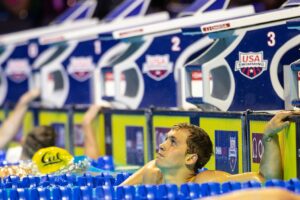
Carson Foster, 2021 (photo: Jack Spitser)
Well, for three minutes and 40 seconds of the men’s 400 IM final at the 2021 U.S. Olympic trials, it was for Foster. He came in as the top seed from prelims and was in second place, 1.82 seconds ahead of Jay Litherland with 50 meters left to swim — seemingly well on his way to Tokyo. But then, Litherland came back while Foster finished third, Foster falling apart on the home stretch.
“I’ve struggled in the past with staying in my own lane,” Foster said. “The first thing that goes wrong in my race, it was lights out for me. And I would just battle those inner, negative voices.”
Foster swam two more events that meet, placing fourth in the 200 IM and eighth in the 200 free. After graduating high school early with Tokyo as a goal in mind, he would not be going there. And he felt almost nothing, because trying to process any whirlwind of emotion would just hurt too much.
After Foster finished his races, he went up to his older brother Jake, who grieved on his behalf.
“I don’t know if I was a little bit numb to the emotion, just because you feel so much when you get third and when you have disappointment, but I didn’t really have any emotion crying-wise,” Foster said. “The only person that cried was Jake, and he cried for me.”
An almost parallel situation happened with Walsh, but the difference was that she didn’t even have a fighting chance. She failed to make it out of the prelims of the 100 free, going over two seconds slower than her best time. Tokyo wasn’t going to be on the cards for her, either.
Like Jake Foster, Gretchen Walsh‘s older sister Alex was emotional over her sister’s struggles. Alex Walsh had made the Olympic team already in the 200 IM, but it still hurt that Gretchen missed out.
“She was favored to make the [4×100] free relay, and then not even advancing to semis, I was just in tears,” Alex Walsh said. “We’re siblings, we’ve talked about going to the Olympics together. It’s hard when one simply makes it and the other doesn’t.”
Smith was at different stage of her career than Foster or Gretchen Walsh. She made the Tokyo Olympic team in the 100 back and 200 fly but had a Foster-esque misfire in the 200 back, leading for the first 150 meters but letting Rhyan White and Phoebe Bacon pass her on the final lap. That same week, Kaylee McKeown broke Smith’s world record in the 100 back.
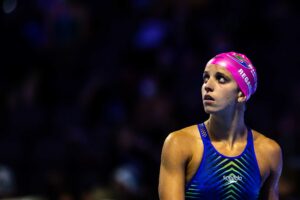
Regan Smith, 2021 (photo: Jack Spitser)
In Tokyo, Smith collected 100 back bronze and 200 fly silver, but it was hard not to be disappointed after she moved mountains two years earlier. The root cause though? The fire just simply wasn’t there.
“Heading into 2021 trials, I was at my absolute lowest point,” Smith said. “I didn’t want to be there, I wasn’t excited, I had no faith in myself, I wanted other people to do it because I thought that they were going to be better off doing it than I was,”
And it wasn’t like the swimmers weren’t good. A month after missing the Olympic team, Foster put up a 400 IM time that would have won Olympic gold by nearly a second. Walsh went on to become an NCAA champion during her freshman season at Virginia. And Smith? Well, she was a world record holder.
The issue clearly wasn’t about reaching new heights. It was about struggling to get there consistently, and when it mattered the most. And that, for the most part, was a mental problem.
“I think I’ve always had the god-given natural ability to swim backstroke, I just never believed in myself,” Smith said. “What I really struggle with is separating emotion from logic, and I think the best of the best are able to stay logical in the hardest of times, and that’s what I struggle with. Because when logic comes out the door, and emotion comes in, that’s when you choke.”
It was not over after 2021. Walsh once again missed the Worlds team in 2022, and Smith didn’t make it in the 200 back. But with the struggles came change and eventually, building blocks. Smith left Stanford to train under Bob Bowman at Arizona State, and Foster cut his NCAA career short to go pro. Foster made Worlds in 2022, Walsh did so in 2023, and Smith swam the 200 back at an international meet for the first time since 2019 that same year. All three swimmers added time in a significant number of events at 2023 Worlds, but that was part of the ups and downs that came with their careers. The road back to feeling like a star again was bumpy, but there was light at the end of the tunnel.
III.
2024 was a full circle year for Foster, Walsh, and Smith.
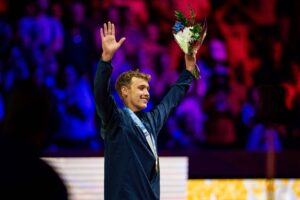
Carson Foster (photo: Jack Spitser)
Foster and Walsh were in deja vu situations on Sunday night. Just like 2021, Foster swam in lane four for the 400 IM final, with Kalisz to his right and Litherland to his left. Just like 2021, he led heading into the freestyle leg. But this time, he held on for the win — and it wasn’t particularly close. When he looked up at the scoreboard and saw the No. 1 next to his name, he buried his head in his hands and sobbed. He was going to Paris.
“I immediately looked to my left and saw that I had won…it was such a big relief first of all the work and everything, mental and physical.” Foster said.
“I’ve been working on staying in my own lane, sticking to my strategy that I know works that I do in practice, and then just knowing when I turned on the freestyle that I was going to be the fastest one in the pool in that leg. I was smiling the whole last 50.”
Just like 2021, Walsh was headed into an event being expected to make the team. But the difference this time around was that she had just broken a world record in the semi-finals — the magnitude of pressure was a lot bigger. She still had one more race to swim, and both Smith and Torri Huske were capable of throwing down times within a few tenths of Walsh’s record.
Even as a world record holder, Walsh was worried, getting flashbacks from three years ago. So before her finals race, she talked to her confidence coach, Christine Shefchunas.
“I just had a lot of what ifs going through my head,” Walsh said. “Thinking like, ‘Well, I need to do that again or I might miss the team. And what if I get third?’ Because going into this meet, I don’t think people had many expectations for me. And [breaking the world record] set a lot.”
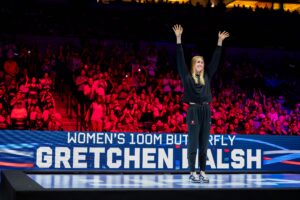
Gretchen Walsh (photo: Jack Spitser)
Once again, expectations were the killer that made everything so much more difficult. Walsh and Shefchunas discussed that all Walsh needed to do was execute her own race without all the outside noise, and that’s exactly what she did to touch the wall first — 14 minutes after Foster did to earn a Olympic spot of her own.
Getting it done is easier said than done, and it wouldn’t have been as easy two years ago, back when Walsh’s coach Todd DeSorbo made her swim at meets in a training suit just so she could get out of her head. Once she realized that she could execute what she truly could do, which happened when she broke 54 seconds in the 100 free for the first time since 2019 at 2022 U.S. Nationals, the pieces slowly fell into place.
“It took a while for me to accept that maybe I can capable of doing stuff like this, like maybe Todd [DeSorbo] isn’t crazy for thinking I can break an American record,” Walsh said.
“I would not be [at this point’ today if I hadn’t reached out for help…it took a lot for me to make it a regular habit of talking to [Shefchunas] and seeking her advice. It’s important when you’re at your highest and when you’re at your lowest to just keep doing that because it’s hard to know when you’re fighting inner demons.”
Foster saw a confidence coach as well, beginning three years ago after he missed Tokyo, in order to get better at swimming fast when it mattered the most. His coach at the time, Susannah Muller, taught him a technique called “brainspotting”, which allowed him to “separate [his] swimming performance from [his] self-worth.”
Initially, when Foster was asked about working with Muller, he was embarrassed — thinking that needing a confidence coach was a sign of weakness. But like Walsh, he doesn’t think he’d be where he is without help.
“Three years ago when I was approached and asked about working with a confidence coach, I was almost a little bit offended,” Foster said. “I knew I needed it, but I was like, ‘I don’t need that.’ and it’s just kind of the stigma towards it. But 100% guarantee I would not be sitting up [at the podium] if I had not done that…it’s totally changed my career.”
After Walsh finished her 100 fly final, she saw Foster and the two shared a hug — a hug that represented a shared feeling of redemption, following years of past failure. Smith saw their swims, and especially after witnessing Walsh break a world record, she was pushed to do something similar herself.
Two nights later, Smith took down the world record in the 100 backstroke, her first world record since 2019. Her immediate reaction was a simple “f*ck yeah,” but the race really was a culmination of five straight years of going 57 after 57 in the event, but never being able to surpass her old best time of 57.57 from 2019. After setting a new best in the event by a tenth of a second this May, it opened the floodgates for her to get faster, and pushed her past her mental block in backstroke.
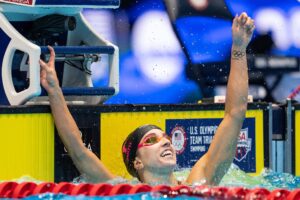
Regan Smith (photo: Jack Spitser)
“I always knew that I had a best time in me, because that’s just a tenth of a second we’re talking about. So it’s like, I don’t know, having longer fingernails or something, you know what I mean?” Smith said of constantly going 57 in the 100 back but never setting a best time for so long. “So I always knew that I had [a best time] in me, but it was just putting together that race.”
Starting in October 2023, Smith began seeing a sports psychologist — who helped her separate who she was as a swimmer from who she was as a person, as well as her emotions from her logic, similar to the brainspotting that Foster did. The combination of seeking help, receiving encouragement from Bowman and seeing the confidence of her successful male training partners helped her improve her mental game significantly.
And soon enough, everything came together for Smith.
“There were many years that went by after 2019 where I thought that I would never [break a world record] ever again,” Smith said. “So that was a long time coming.”
The journey is still far from over for these three swimmers, who will head into Paris as both three of Team USA’s biggest stars – though with a lot of hurdles to get over. Smith will have to battle it out with Kaylee McKeown in backstroke races that may require a world record to earn gold, Walsh will be expected to win in a competitive 100 fly field, and Foster will have to get past the giant that is reigning two-time World Champion Frenchman Leon Marchand in the IM events. The three swimmers are still continuing to develop in their own respective journeys, and Paris will be yet another stepping stone. But from 2019 to now, they’ve come a long way.
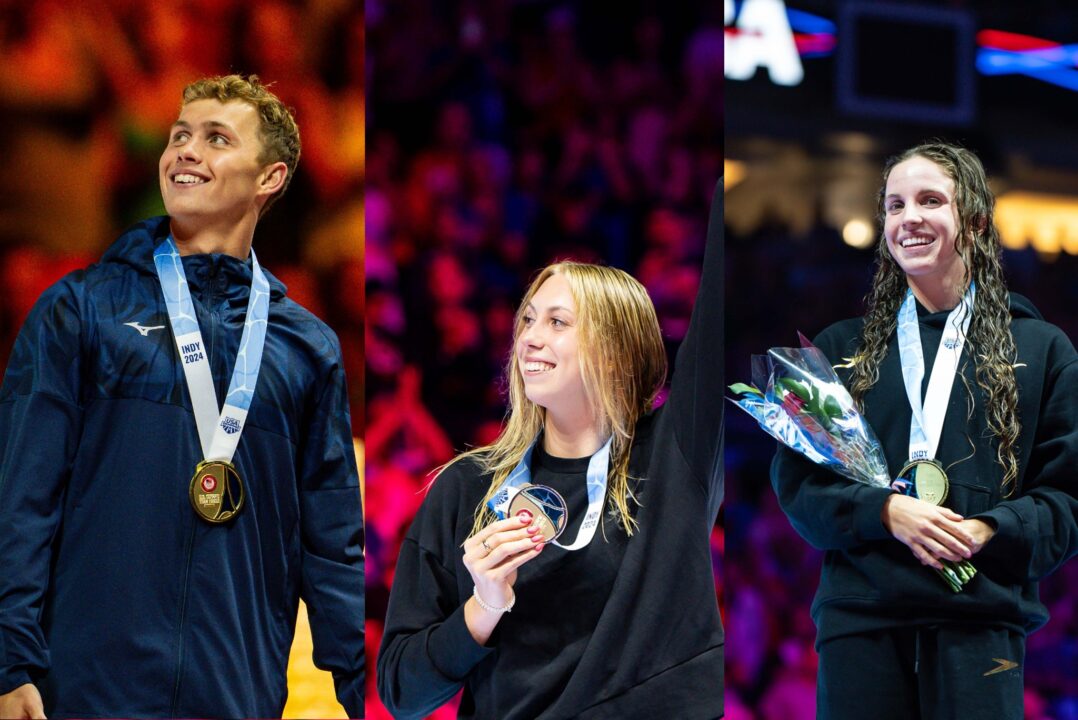
Great article YanYan, such an important topic and really cool to see these separate narratives wrapped up in one place.
Great piece, YanYan! Well done!
The writer wrote with a heart . Very inspiring
These are the kind of stories that make you realize how inspiring this sport can be. Each and every one of us has plateaus and mental lows in life. The key is to let swimming be a means to come out of it instead of the source.
So we’re calling sports psychologists/therapists “confidence coaches” now?
Feels like that doesn’t help the stigma Foster referred to or that the greats of the past generation(Phelps, Franklin, Schmidt) have worked to break.
Maybe Christen is not a sports psychologist by training and that is why she calls herself a confidence coach rather than a sports psychologist.
True, upon further research it seems like this is the new word for life coaches. Still a little concerning for those who may seek out similar help and not have access to big names like Christen.
I’m enjoying seeing Regan Smith (swimmer)’s vernacular start to resemble that of Regan Smith (NASCAR driver)’s (I assume)
Regan makes it seem like the 100m backstroke world record is only meant to be hers and she was the only one that had it tough leading it to toyko. Girl sit down.
Well, that’s a stretch.
I don’t think that’s a fair assessment of what she said at all
teared up reading this 🥺